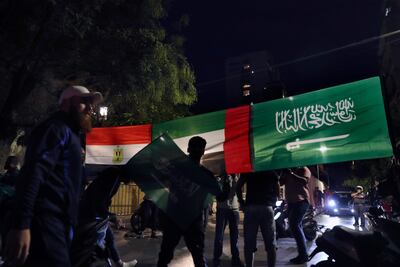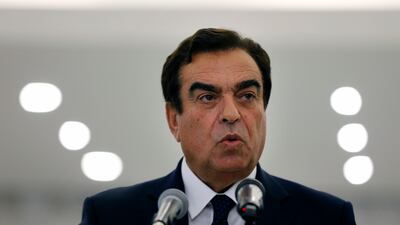After years of political and economic turmoil, the scale of Lebanon’s growing institutional failures is losing the capacity to shock. And yet, politicians in Beirut continue to invent new ways to deepen their country’s quagmire.
Some are egregious gaffes. On Saturday, a video emerged of two senior government officials smirking and shrugging off responsibility for a programme of ration cards that had been promised to help ease people's suffering. Today, 80 per cent of Lebanese live in poverty.
Others are illustrative of the dysfunction at the heart of the system. Last week, an interview recorded in August was released in which the current Lebanese Information Minister George Kordahi expresses support for Iran-backed Houthi rebels in Yemen. His comments have triggered a diplomatic crisis with Gulf countries. Among other incendiary statements, Mr Kordahi asserted that the Houthis are “defending themselves".
There are two components to the massive irresponsibility of this claim. The first is that it is untrue. The statement is, instead, an offensive simplification for Yemenis who are threatened everyday by a hugely violent group that seized their capital, Sanaa, in 2014, forcing an internationally recognised government into exile. Regional and Western diplomats consistently draw attention to the group's sabotage of peace initiatives. Every month there are new signs that they remain committed to aggression. On Saturday, there were reports that the group shelled a residential neighbourhood, killing at least three children from the same family. Contrary to Mr Kordahi's belief, there are no grounds to claim self-defence with such a record.

The second component is that his assessment jeopardises a number of Lebanon's most important diplomatic alliances. Saudi Arabia, the UAE, Kuwait and Bahrain have now recalled their diplomats in Lebanon. These relationships do not just matter to its reputation on the international stage, but affect its very ability to serve and feed people. Trade with Saudi Arabia, for example, has been suspended.
Some of Lebanon's senior politicians have expressed their regret over the episode, re-affirming willingness to maintain strong relations with Gulf countries. In a recent tweet, President Michel Aoun suggested this could be done through more bilateral deals.
In Lebanon, what presidents and prime ministers want is not necessarily what the country gets. And while nothing should get in the way of ministerial accountability, a misstep now could easily lead to the dissolution of Prime Minister Najib Mikati's new government, one that took more than a year to form.
The ability to govern will require the re-establishment of trust both inside and outside the country. It has proved to be a complex and drawn out process. The behaviour of Mr Kordahi, who for years worked for Saudi-owned MBC group, will further undermine these fledgling foundations. He has so far not been held accountable for his actions, thanks to support from factions loyal to Iran.
Potential donors will only assume that their worst fears about the country have been proven right, and vital development funding will never be accessed, delaying reforms and making Lebanon's crises a permanent state of affairs.
But however difficult, this test is one Mr Mikati and Mr Aoun will have to face. If they cannot keep even the closest of allies on side, nor rein in ministers who endanger the country's vital relations, then Cabinet or no Cabinet, the wider government will fail the people it is meant to serve.


